Last Updated on January 31, 2012
I've recently ordered an issue of Vogue India on eBay to subject it to my most thorough analysis. As Indian culture is completely different from the European culture I'm used to, I wanted to see if that translates into a different Vogue too.
I was particularly interested in whether Vogue India - like the Western media - also promotes an extremely narrow standard of female beauty.
+++
My most shocking discovery wasn't that Vogue India is absolutely guilty of the above crime. It was that many Indian people (mostly women) are so obsessed with fair skin they'll go to the ends of the Earth to lighten theirs. They believe dark skin is ugly and light skin guarantees more opportunities in life. For example, "in newspaper advertisements through which brides and bridegrooms are sought, fair skin is ranked as a more desirable attribute than a university degree" (source).
Vogue India fully endorses this mania by featuring exclusively light-skinned models and celebrities. Even some of the more "regular" people in society pages could pass off as Hispanic or Latino!
The magazine also advertises several skin-lightening creams:
Quick background on skin color issues in India: Indian people from North India generally have lighter skin than those from South India because of different climates. The point is that the average Indian person is not as light-skinned as models, celebrities and Bollywood actresses. Many sources claim that the fascination with lighter skin stems from India's caste system. People from the higher classes were lighter and those from the lower classes were darker because they did a lot of manual labor under the sun. So lighter skin was associated with wealth and power.
The same mindset carried on after India had been colonized by Britain. Again, the ruling class was light-skinned. Many say the situation in India is much the same today, even with the British gone and the caste system officially abolished.
+++
My opinion about using skin-lightening products is mixed. On one hand, I believe everyone is free to do whatever they want as long as they're not hurting anyone else. I therefore support fairness creams. If they produce good results that make people happy, that's amazing. However, it's sad the opinion that only fair skin is beautiful is so deeply ingrained into the culture. This means skin lightening is often not what Indian people do for themselves. They're pressured into it by society.
Foreign cosmetic brands' fairness creams have only a small market share in India (source). The most popular is a domestic brand called Fair and Lovely, notorious for this advertisement:
The advert was known as "the air hostess ad".
It showed a young, dark-skinned girl's father lamenting he had no son to provide for him, as his daughter's salary was not high enough - the suggestion being that she could neither get a better job or get married because of her dark skin.The girl then uses the cream, becomes fairer, and gets a better-paid job as an air hostess - and makes her father happy. (source)
Way to convince people skin color is only relevant when it comes to judging beauty!
+++
It bothers me that only light skin and an almost European look are good enough for Vogue (India). It bothers me to see magazines suggesting people have to change something about their physical appearance or personality. Vogue especially is supposed to be about beauty and art - which are never uniform - but it's all theory instead of practice.
+++
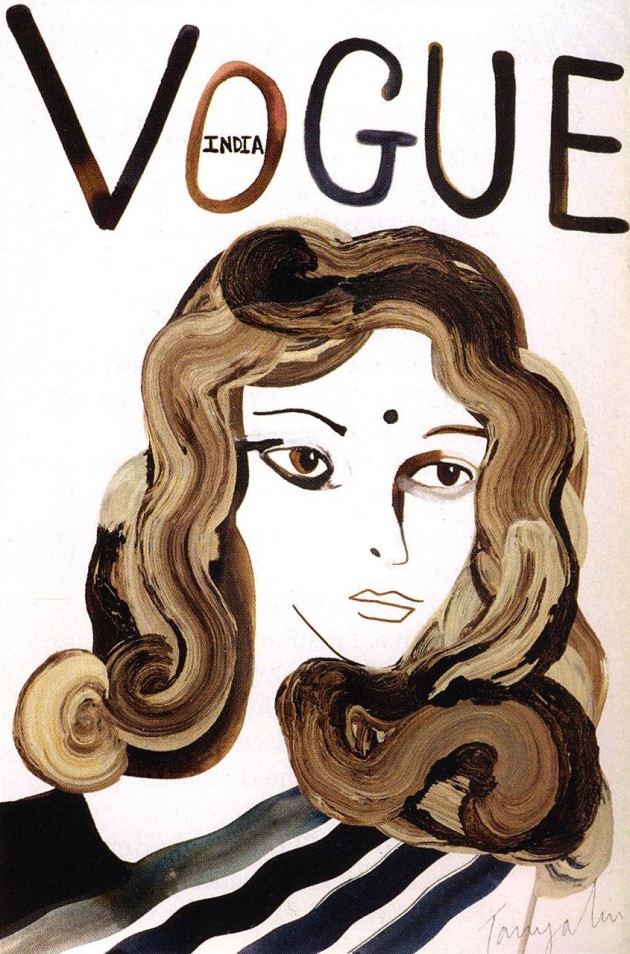
Vogue India likes thinness, too. Former Miss Universe gone famous actress (who looks white) complains in an interview that she needs to lose 6 pounds to fit into body-con dresses. Pages later, a celebrity cookbook author (who looks slightly tanned) shares her tips on how to lose weight. They're disguised as nice, telling you to indulge in "guilty pleasures" every once in a while, but it's a diet. Plain and simple.
Do people think they should lose weight before stumbling upon dieting tips in a magazine or after?
+++
Vogue India is a licensed magazine, so the fact that it prominently features some of the more disturbing Western obsessions can definitely be attributed to that. Condé Nast has a say in the content of every Vogue edition and there's a whole lot of money in first showing you dream skin, dream weight, dream closet, dream spouse, dream lifestyle and then advertising whatever is supposed to help you achieve these things (but it really won't).
Not everything I've mentioned in this very "J'accuse" post is Vogue India's fault. Still, I feel incredibly disappointed that insane "beauty ideals" enforced by either the media or culture aren't going away but rather becoming omnipresent.
If you liked this post, please share it on Facebook or Twitter. Thank you!

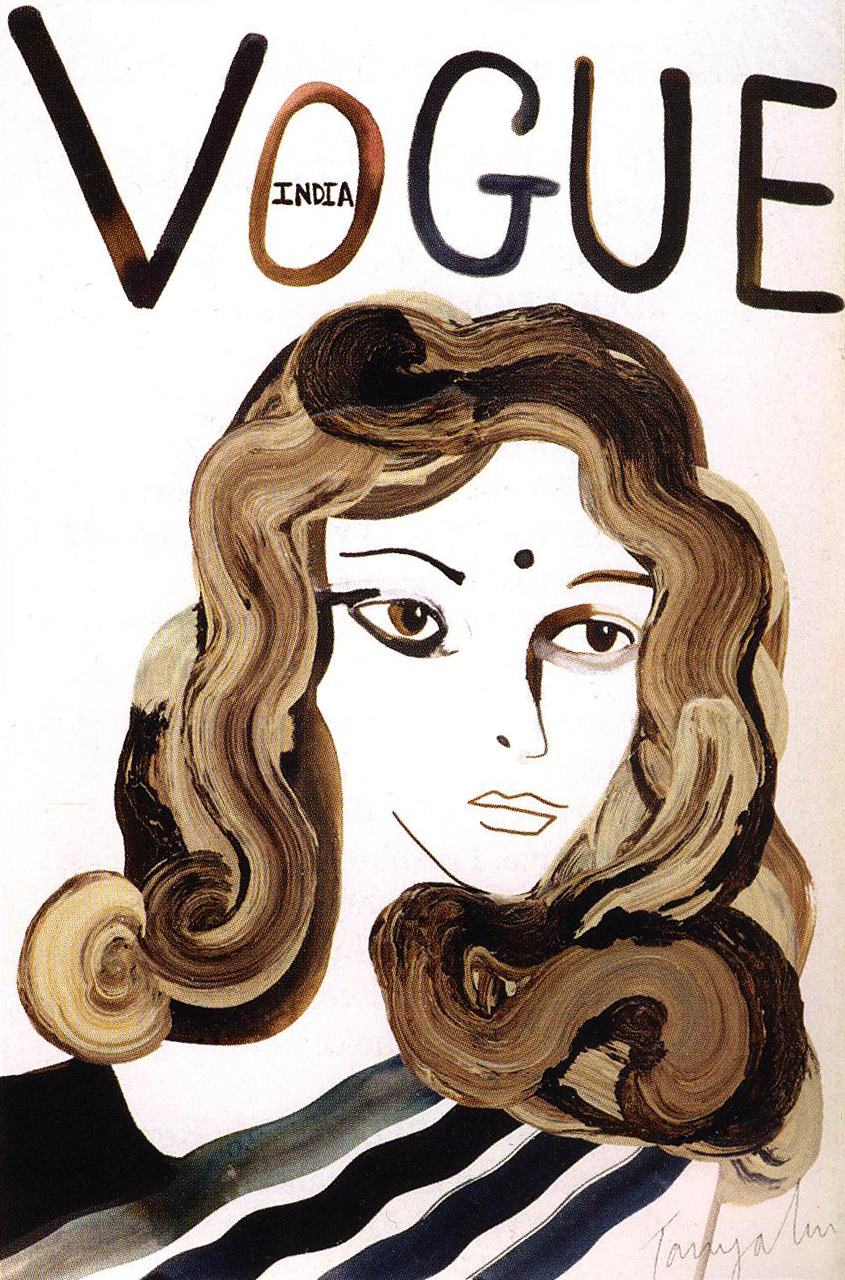
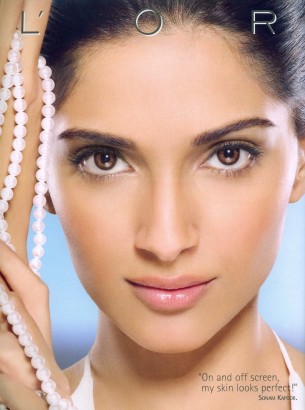
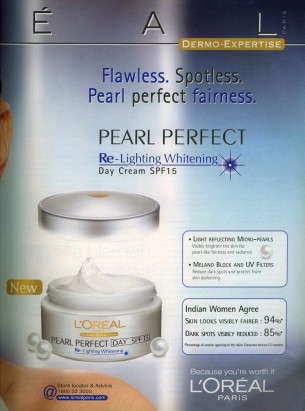


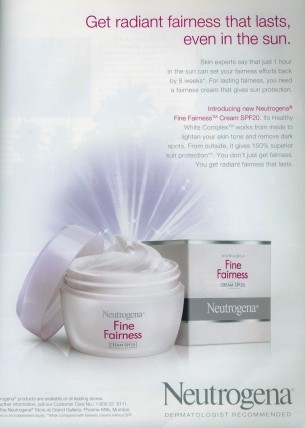
I knew about the fair skind trend in Asia, but I was still surprised to see brightening creams in every corner shop in Thailand, not to mention bigger shops and pharmacies. however, if you think about it, how is that different from the imposed ideals in our culture? just look at all the retouching in the magazines. it's fucking sickening.
''Condé Nast has a say in the content of every Vogue edition and there's a whole lot of money in first showing you dream skin, dream weight, dream closet, dream spouse, dream lifestyle and then advertising whatever is supposed to help you achieve these things (but it really won't).''
It's the same with every culture, minus the skin. But even with the skin: come on, how many dark skin models are there in other editions of Vogue?
And it's the same with weight. And the closet ... Well we all now that most people can't afford clothes shown in Vogue.
So in a way, we have a caste system in every society and we will continue having it as long as we live in a monetary system.
Ahhh Eva, kako rada berem tvoj blog zarad takih objav kot je tale. Res, trenutno sem tako navdušena, da sploh ne vem kaj naj napišem v komentar. Indijske obsedenosti z zahodnjaškimi standardi lepote sploh ne bi komentirala. Tudi tvoja angleščina je več kot na nivoju. Super res.
Hvala! Jaz pa sem zelo vesela, da imam tudi slovenske bralke in bralce, ki so sposobni brati moje dolge poste v angleščini. :)
I think this is terrible. As someone with very very pale skin, I know it's never fair to see ideals that you can't live up to. In North America the ideals are only changing slightly to accomodate us natural pale skinned people, but we still get called pasty or ghostly, or translucent as I've been called a few times. Having to deal with tan skin being ideal here isn't any better than in India with their light skin preference. I'm not saying either situation is worse off, but I think that people should accept their skin color, light or dark, and be judged on their attitudes and such instead of appearance.
I completely agree with everything you said, plus, skin whitening creams are not necessarily safe at all, depending on what they have in them, they can be toxic (mercury), irritant (hydroquinone) or permanently thin the skin out (corticosteroids to counteract inflammation fro hydroquinone), not to mention strong Vit A which shouldn't be used whilst pregnant, hydroxy acids which will sensitise the skin to the sun and cause uneven pigmentation etc.
I stopped buying all fashion magazines precisely because of all this, and I have to agree that Vogue is the worst in this respect (most restrictive and unapologetic about selling low self esteem).
in my profession there are many Indian women and I have seen over the years a huge feeling of deficiency because of their tan, and extreme worship of white skin, to completely unreasonable extent, much like we worship anorexia. As long as women are strongly objectified and subdued, they will be easily convinced that if they were only "more white/thin/beautiful" they would have better chances in life...
Even worse is when people use more extreme methods of skin bleaching like pills and DIY stuff made of super strong substances. It's so sad and strange that although they know it's dangerous, so many seem to go through with it nevertheless.
Especially when I was younger and more keen on media (I read almost no magazines today and never watch TV, I also mostly ignore daily news because it's not objective), I was quite prone to thinking what the media was suggesting should be my own standard too. There was also so much peer pressure in elementary school for me because you had to be like everyone else. I still want to be something I'm not sometimes, but I've learned to acknowledge it's not really me.
oh, gosh, absolutely! at my work i see quite a lot of such damage, it is really so sad... I also stopped watching news and reading papers years ago, and you know what? I never actually miss anything relevant that's going on anyway!
it's really great you have consciously resisted that peer pressure, I can tell you, you are much better for it because of the individuality and style you developed. it is easy to get seduced by consumerist promotions in all the magazines and tv, and actually miss relevant fashion and style.
Prav nič drugače ni na Japonskem. Kanebo tam npr. proda največ krem prav za posvetlitev obraza. Tudi ostale blagovne znamke kot so Chanel, Dior,... imajo za azijski trg razvite izdelke za čudovito belo kožo (pri nas jih niti ne prodajajo, kot tam najbrž ne samoporjavitvenih krem). Na sploh so licenčne revije na Japonskem in Kitajskem polne obrazov belk (najbolj smešno se mi zdi, da jih uporabijo tudi pri predstavitvi trendov za ličenje)
In vendar bi rada izpostavila tudi domačo težavo z barvo: lep in zdrav zagorel videz. Mediji in medicinska stroka lahko še tako trobita, da zdarvega zagorelega videza ni, pa bo bledolično dekle za katero kožo bi v Aziji ubijali, na naših ulicah poleti prava redkost. Ni kaj.
Saj veš, da v naše kraje trendi kljub internetu in globalizaciji še vedno prihajajo z zamudo. ;) Morda nas bo čez 10 let poleti že kaj več "nezdravo" (tako temu najraje pravijo) belih. "A ti pa nisi bila nič na plaži?!" Ajajaj.
V celi Aziji je enako - na Japonskem celo kreme za sončenje vsebujejo belilo. Bela polt se na enak način promovira tudi na Kitajskem, Indoneziji, Indiji, Tajski itd. Ko sem potovala po teh državah, sem bila deležna veliko pogledov in ustavljanja na ulici zaradi bele polti. V južni Indiji sem šla na masažo, kjer mi je maserka več čas šepetala, da sem prelepa. Zaradi kože seveda. V Bangkoku sem hodila v isto restavracijo vsak dan dva tedna. In vsakič je bilo veliko dotikanja in božanja po roki od lastnice. Ko sem se vrnila iz otokov, me je pogledala in z žalostjo v očeh rekla, da nisem več lepa, ker sem porjavela :)
V času potovanja sem govorila z domačinkami, ki sem jih spoznala tudi glede obsedenosti z belo poltjo. In v bistvu, je problem bolj kulturno pogojen, kot si mi predstavljamo. V Aziji je bela polt namreč sinonim za bogate ljudi, katerim ni potrebno delati. Rjava polt pa je od nekdaj pomenila sužnje ali reveže, ki garajo na polju cel dan. To prepričanje izvira še iz časov antike, npr Egipt. Najbolj zanimivo pri celotni zadevi, pa je da za naš "moderni" zahodni svet velja ravno obratno - če si bel, veljaš za nekoga, ki dela cele dneve, če si rjav, pomeni da si bil na počitnicah in da si užival :) No, počasi pa vsi spoznavamo, da sonce tako in tako ni zdravo.
I remember the first time I saw a skin bleaching kit in the store in NYC when I was 18. I was shocked, but when I expressed it to my friends, they acted like I was crazy for thinking it was odd.
Even in US magazines, so many African American women are whitewashed. The Beyonce ads are the worst. They lighten her skin by at least 3 tones.
This is a wonderful post - and quite thought inducing. It's interesting to see how mainly-Western magazines like Vogue translate to other parts of the world - it seems that it is too easy! The concept of skin lightening creams fascinates me!
Kudos to you for pointing this out, it is something we need to focus on, raise awareness about, and discuss!
I too had heard about the skin whitening trend in Asia but it was still shocking to see whitening lotions stocking the shelves in every supermarket in Cambodia when I went there this winter. I found it especially shocking that most of them were produced by Western cosmetics labels (which is also confirmed in the ads you show in your post). More money that goes from developing and threshold countries to already rich countries, and just because of cultural pressure... gah! I seriously feel like boycotting these labels, but that leaves me with little choice of cosmetics.
For me, boycotting is not the answer. These brands are giving people what they want. If I lived in India and thought my skin was too dark, I'd be extremely thankful for such creams. It's similar to plastic surgeries.
Wow. I really hope that people start to realize that any skin colour is beautiful.
I think Indian women are gorgeous, no matter how light or dark their skin.
Sadly I'd say they're mirroring western attitudes adjusting it to their own cultural traits. Stick thin models. Check. Color issues. Check. We're probably more aware of it and magazines try to hide it by throwing specific issues at us (the plus size edition, the all black issue, the all black editorial and whatever else they can think of) instead of integrating these models in their regular flow of work.
Unfortunately India's deep rooted social problems seem to be incorporating these in their own twisted way :(
Hvala za tole objavo, ker sploh nisem imela predstave o tej temi in sem se naučila nekaj novega in mimogrede tvoja angleščina je odlična!
Žalostno, da revija kot je Vouge uporablja belopolte modele. Moje mnenje je, da je vsaka barva kože lepa. In v lokalni izdaji revije bi morali biti modeli iz tega okolja. Žalostno, nadvse žalostno.
Hvala še enkrat za tole objavo.
Hvala, Kristina! Super, da je bila objava koristna. ;) Tudi meni bi se različne Vogue izdaje zdele zanimivejše, če bi bile manj licenčne in bolj "lokalne". Podobno je pri japonskem Vogue, ki ga itak delajo v Milanu.
There are quite some influential people in India who are mocking the trend, but not enough, alas. The most common expression in Indian ads is supposed to be "wheatish skin", whichis indeed an asset. :-(
I used to be called "Gipsy" in Slovenia quite often, at school (and once in Germany), because I am somewhat darker than the rest of you and my face looks Gipsy-like, but that didn't bother me at all, I don't know why. I did notice as a kid that blonde, beautiful-eyed girls get more affection and attention, but I wasn't a sucker for too much attention of this kind, anyway, because I had Things To Do. :-)
Also, I never got to understand why someone should spend a thought on other people's skin. I mean, I know these things exist, but I do not comprehend the feelings or urges behind them. Like, in my humble opinion, Michelle Obama is one of the most beautiful people I've ever seen, but then, she'd be beautiful with any other skin color, too. And translucent-skin :-) people are beautiful as well, no need to reduce them to their skin color at all!
Oh yes, the Slovenian obsession with "gypsies" *rolls eyes* The same was happening when I was in elementary school, there was a classmate who was slightly darker than others and couldn't escape the "nickname" for years. Unfortunately, he didn't have Things To Do. :(
I also completely agree with your last thought, I mean, skin color isn't even that *interesting*.
Oh, yes, this type of racism goes on in the Caribbean, too. Many caucasians believe that cultures where white is not dominant are free of racism but it's actually worse. Even within families, lighter skinned children can be favoured.
I have been reading Vogue India for years, and yes, this may be true. But the magazine also put on an incredible issue celebrating all skin tones- you can see it here: http://www.vogue.co.uk/news/daily/100412-vogue-india-promotes-darkerskinned.aspx
xx
Meera
Thanks for the comment! I came across that article when I was writing this post, but honestly, I wasn't too impressed. If they truly wanted to celebrate all skin tones, they'd do it in every issue, not only in one. And even on this cover I think not one of the models is actually significantly darker.
I had no idea about this, though I now realise that a lot of Bollwood actresses like Aishwarya Rai have almost white skin and I can see how this would affect the mindset of a young Indian woman in pursuit of beauty.
Thank you for a great post shedding light on an issue I had not considered before!
Thanks for your comment! Precisely, Aishwarya Rai is one of the more extreme examples of this phenomenon.
Oh, tell me about it! I am Indian. Not just Vogue India, Even Elle India and other magazines promote fairness. I personally oppose fairness creams because a) they promote insecurity in young girls, my younger darker skinned sister is an example. and b) fairness creams are only for the already fair ones. I don't know a single person who used fairness creams and became magically light-skinned. That said, Garnier Light is one cream I used once to get rid of dark circles and it made me look white-washed for an entire evening. It's very harmful for daily use. I think people should accept their skin colour and complexion. I see so many beautiful dark girls on a daily basis. They look much better compared to their fair counterparts.
hi, this is definitely a good post. i am an indian (south), and am a victim of this scenario. i am dark complexioned and never used to be bothered about, unlit i finished my degree. once it came to my marriage, i faced grooms, who rejected me for my complexion. now that i am married to a darker complexioned male and he is such a lovable person, i have fair skinned sister in laws and other relatives, who look a little down at me for my complexion, blames me for my dark complexioned son. now that i browsed through the net and consumed vitamin C with MSM (methyl sulphonyl methane), i recieve less comments because i have lightened my complexion for about 3 shades. obviously girls like me search for whitening pills, creams, facials, etc.. to escape this kind of situation.
as far as the caste system is considered, though officially banned, it still exists among every indian, in his/her family and life. for example, i am looked down for my complexion because i am an odd personality with respect to complexion, from a higher caste society. i can survive all such comments, for i know how best i am, and my spouse knows me better. but there are girls who are serious victims. the cosmetic industry makes a lot of money targeting such females.
I was born and raised in India and I am Indian- as far as I know- people like if you darker with nice features-if fair and do not have good features-they do not like. Most of Indian women love natural prodcuts. It is incorrect of the author to say in the article that darker skin people are low caste due to low jobs and lighter ones are high caste". there are lighter skin and darker skin in both low caste and high caste in India.
It's sad that women are pressured to change the colour of their skin in order to be considered their culture's definition of "beautiful". In Australia, it's all about being tanned. Pale skin (which I naturally have) is considered undesirable and unattractive. We women need to stop listening to the advertisers and realise that there is incredible beauty in diversity and learn to accept and celebrate the skin we're in. Easier said than done though!
It's the same here in my country (Philippines). Flip through the pages of local fashion magazines and you'll see advertisements for skin lightening be it creams, lotions, or pills. The less educated people especially think that if you're very pale/fair, you're rich and if you're dark you're poor and/or ugly. Obviously, media's mostly to blame.
Tale objava je že kar stara, vendar sem po ponovnem ogledu naslovnice indijskega Vogua (ilustracija mi je zelo zelo všeč) vseeno odločila nekaj napisati.
Trend svetle kože ni nič novega vsaj v Evropi in Ameriki ne. Izhaja še iz časa prejšnjih stoletij. Spomnite se renesanse in baroka, ko so idealizirali belo polt in nedolžnost.
Bela polt je imela v aristokratskih krogih od nekdaj simbol nedolžnosti, brezdelnosti in čistosti tudi v Evropi.
Ne bi se ravno strinjala, da je uporaba krem za svetlitev kože trend. Gre predvsem za kompleks manj vrednosti azijcev in afro američanov, ki smo ga z globalizacijo ustvarili ravno MI Evropejci in Američani. V nekaterih delih tretjega sveta je "bela barva kože" sinonim za nekaj boljšega in bogatejšega.
Žalostno, vendar resnično in točno načrtovano. Še bolj tragično pa je to, da vse te umetne kreme in kozmetika po letih uporabe na koži puščajo posledice v telesu pa strupe.
Farmacija je izredno premeten lobij in vendar smo potrošniki sami krivi, da se tako okorišča.
Pohvala tvojemu izvrstnemu pisanju in objavam!
The same goes for many parts of Latin America as well. The majority of the actors & the elites are either ethnic Whites who are mostly of Nordic ancestry or European-looking mestizos while the poor ones living in rural areas are the brown-colored Native Amerindians or mestizos who are predominantly Native. This is also more common in Africa & in Asia as well. So I think it happens not just for Indians but also for other non-whites.
Comments in the article, and related comments to the article, that indians are going for a "european" look, when some want lighter skin, is completely off. There are Indians that are naturally light skinned. You can still be Indian with very light skin. The Indians that are light skinned are not any less Indian because they are light skinned. Light skin is a traditional Indian look. Indians going for a lighter skinned look don't want to look European, but only like a light skinned Indian.
I find hilarious the comments that light skinned Indians have a Latin look. The opposite is more accurate - that light skinned Latinas look Indian.
Well you know how it is...Hitler used fear to sell his ideas and I guess it's all happening today with cosmetic brands and magazines. They find the worst fear of the female population in a certain country and they use it to sell their products/magazines.
P.S.: I just spent 2h strait on your blog. It's mind blowing and reminded me why I started blogging in the first place. It's so easy to get lost in all these blogs today, but I'm glad I found yours. It's truly unique and your posts really made me think again of what I want my blog to be in the future.
Thank you
Love xoxoxox
Thank you Maja, I'm really happy you find my blog inspiring :)
I'm a masters student in the UK, I would love to know what issue of Vogue India the ads you've scanned featured in (date, issue number) cos I am analysing them for uni and it would be great if I can say when precisely they were from.
Thanks
Ella
Hi Ella, unfortunately my copy of this issue is in another country, so I can't look it up. Did I not mention the date in the article? I think it's from 2010.
Thank you for writing this, Eva.
I've recently moved to South East Asia from Britain and the frequency and acceptance of skin whitening products is simply depressing. I think the only way to combat it is to raise the self-esteem of the average PoC to a point where they can see these campaigns for what they really are.
I'm starting a tumblr to document these occurrences by global brands (the most heinous so far being Unilever). Would you mind if I use your scanned images on the blog, with attribution and a link to this article?
Hi Chris! Thank you for your comment and kudos to your initiative. Feel free to use the images on your blog.
I always love when authors post meaningful and great articles, it brings me great happiness and makes me feel I'm not the only one who stands for what is rightful and real. :D Great post
Human nature is a freaky thing.
Hi Eva, this is such a great thing and useful. Thank you for writing about this issue. I am a student and now I'm doing a research about this issue in India and I need some pictures form magazines for my research. Could you suggest me which magazine I could use? It would be really helpful for me if I can get some suggestion from you :). Thanks in advance.